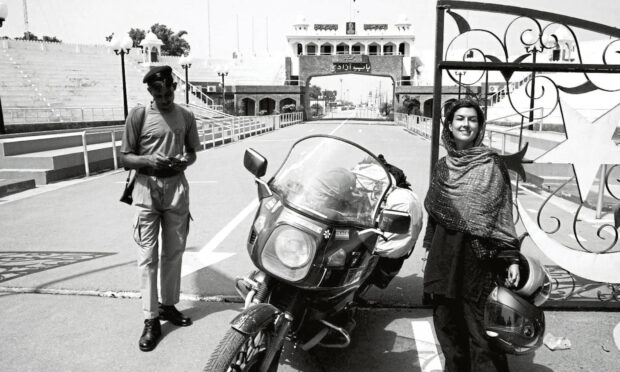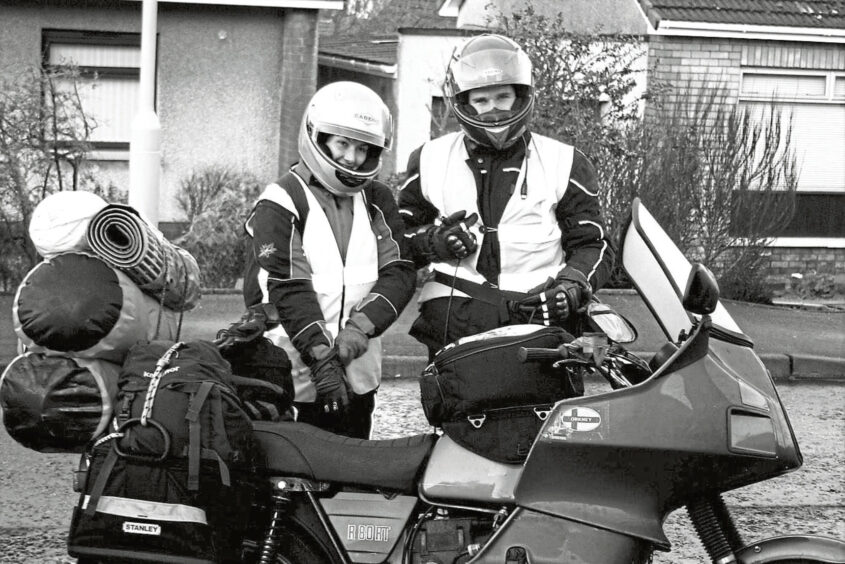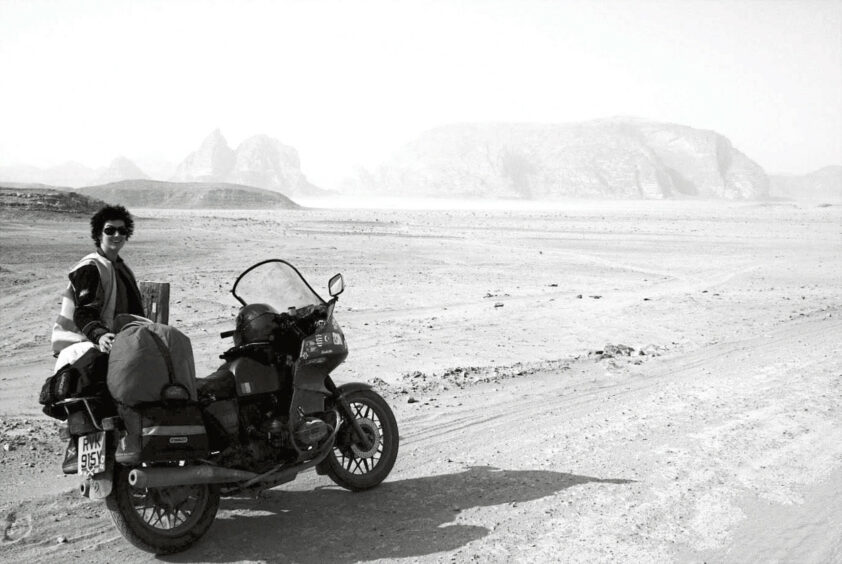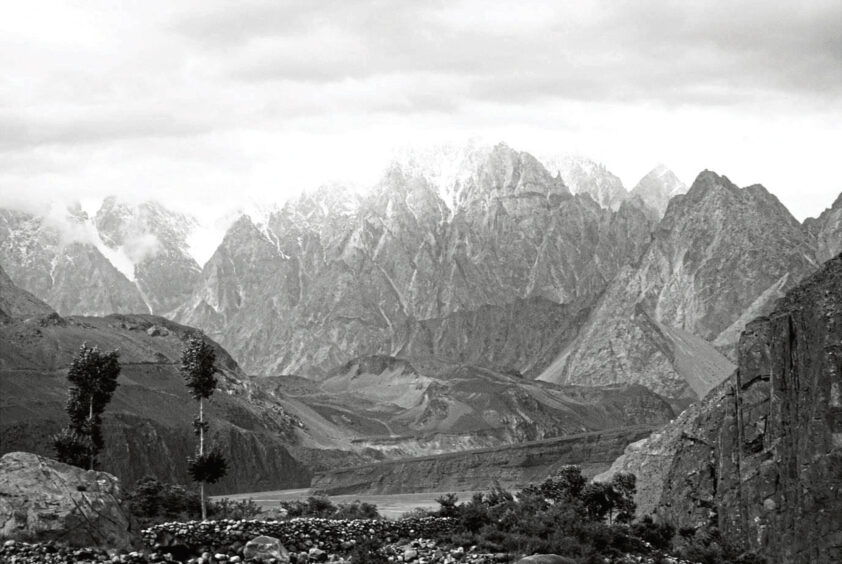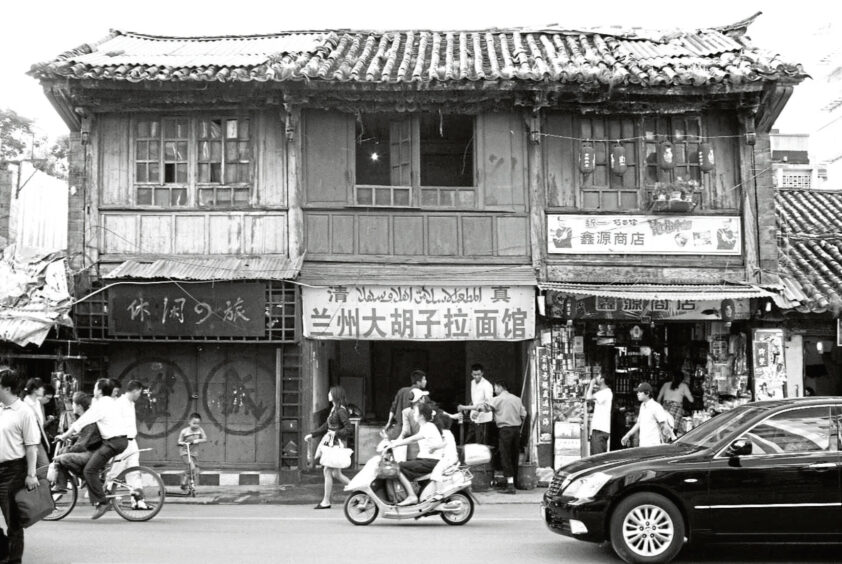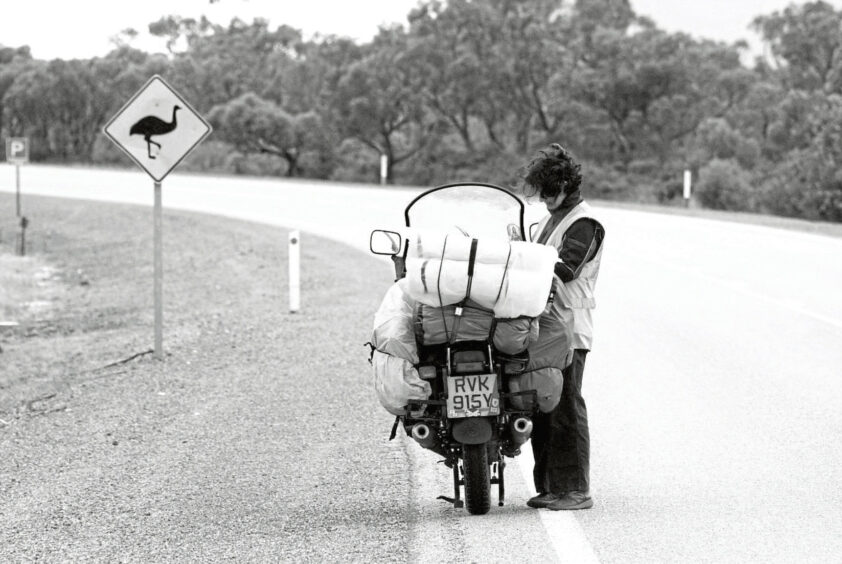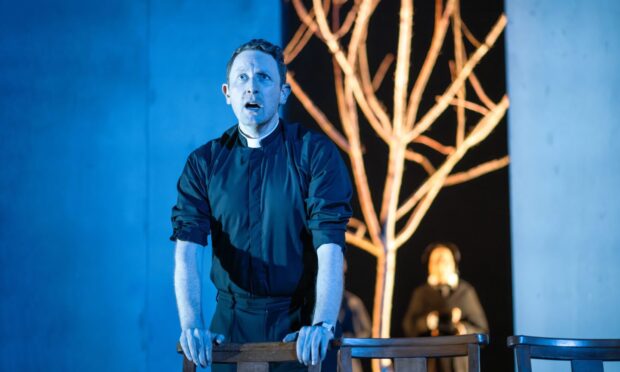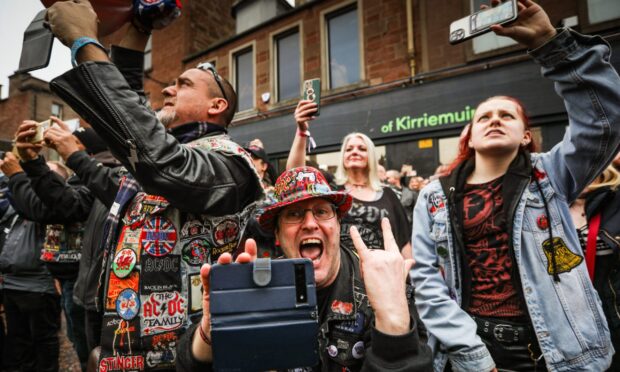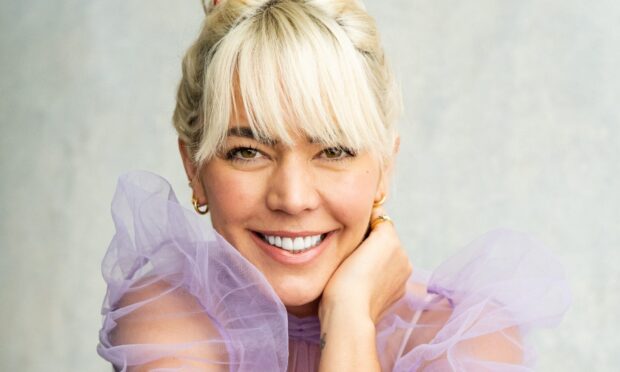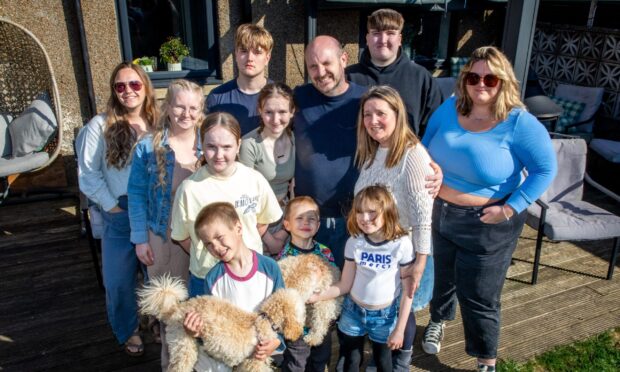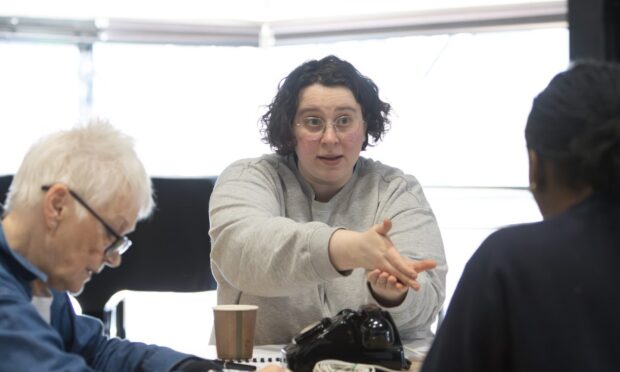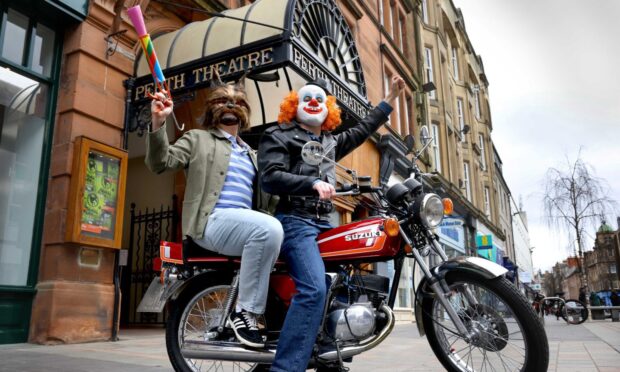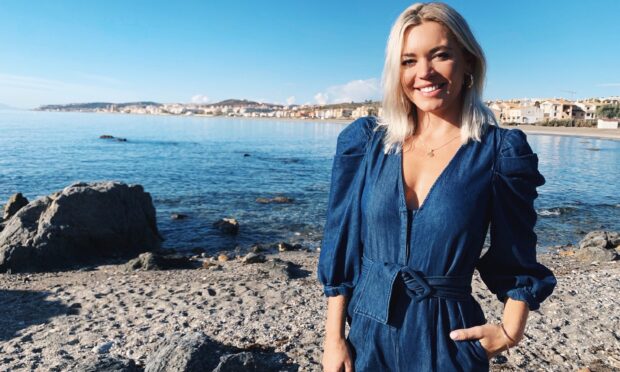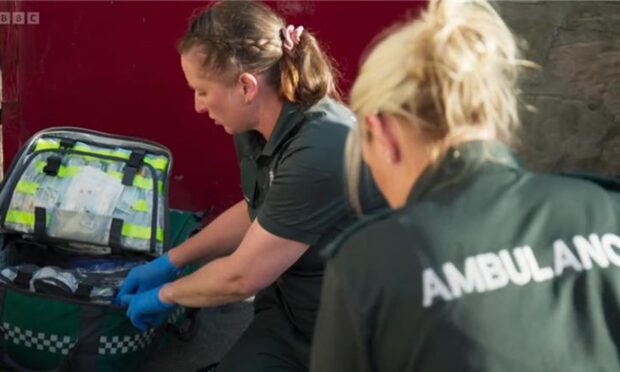Scottish-Italian writer, poet and academic Esa Aldegheri completed an epic 18-month motorbike adventure across the globe. Gayle Ritchie finds out more.
It was a bleak, wintry afternoon when Esa Aldegheri sailed under the Forth Rail Bridge on a ferry heading for the Belgian port of Zeebrugge.
Below her, in the hold, her motorbike waited; beside her stood the man she had just married.
The couple were on their way to New Zealand, overland, as much as geography and politics would permit.
After being waved through customs at Zeebrugge, Esa revved her motorbike, a stunning red BMW 800cc which she’d nicknamed Mondialita, and whooped with glee at being free to go.
“Already the air felt different, alight with possibilities,” she recalls.
“We were soon on the wide motorways of France, the tarmac spooling out between immense fields.
“I edged our motorbike towards the upper reaches of the speedometer: a terrifying and magical margin where even the tiniest change in balance, or pressure on the handlebars, communicates instantly through the bike to the road, and it feels as if your mind and body are a single impulse of movement.
“This state of hyper-vigilance, of almost transcendental concentration and awareness, was the most awake I had ever felt.”
Strict rules
Born in Glasgow (her mum is Glaswegian) and raised in Lombardy, a small village in northern Italy (her dad is Italian), Esa grew up in a culture with strict rules on what girls couldn’t and shouldn’t do – and riding motorbikes was a complete no-no.
And yet here she was, aged 28, setting off on the trip of a lifetime – on a motorbike – proving that women don’t just ride pillion.
Moving to Scotland to study Arabic at Edinburgh University, Esa had met and fallen in love with her Dunfermline-born husband while they were both students.
Married in 2005, they were undeniably happy, and yet restless.
It was this restlessness that inspired couple to quit their jobs and spend their savings on a journey overland to the opposite side of the planet: New Zealand. The vague hope was that they would pick up work along the way, Esa as a languages teacher, her husband as a medic.
Deciding how they would travel turned out to be as simple as a list of pros and cons sketched on a pub napkin.
However, there were stumbling blocks – neither knew how to ride a motorbike nor owned one, and they had no clue about mechanics.
‘Girls just didn’t ride motorbikes’
After reading a tonne of motorbike manuals and travel books, Esa signed up for lessons. And she was determined not to let her early memories of motorbikes in Italy, where they were only ever ridden by boys and men, put her off.
“Girls just didn’t ride motorbikes, unless they rode pillion, preferably in tight jeans or short skirts,” she recalls.
“I once tried my brother’s moped. With an audience of family and friends, I wobbled onto it, started the ignition, opened the throttle, closed my eyes, and drove straight into a concrete gate post. I was aflame with humiliation.”
On the day of her motorbike test in Edinburgh, astride a Suzuki 500cc, she wobbled even more than on the Italian moped.
But to her delight, she passed and she felt her new driving licence was like a “fanfare” – “a triumphant message to the world: I could do this, despite the fear”.
Maintenance
Signing up for a motorbike maintenance course, she was the only woman. Initially embarrassed by her ignorance, Esa was soon taken under the group’s wing, and she was honoured when, at the end of the course, fellow students gave her a compass as a gift, “for the road ahead”.
Next was buying a motorbike capable of managing an open-ended journey across the planet – they had no plans to return to Scotland.
Girls just didn’t ride motorbikes, unless they rode pillion, preferably in tight jeans or short skirts.”
One they could afford popped up in a local newspaper, a stunning red BMW 800cc touring model, which they snapped up.
Then came the job of packing light. Tools and spare parts were essential but there were strict limits on what each could have: one change of clothes, one warm jumper, minimal toiletries and one book. A Haynes manual on BMW motorbikes was bundled in and read obsessively, along with a tent, sleeping bags, mats, waterproofs and loo roll.
Adventure begins
The couple set off on their adventure in late 2006 from Orkney – where they were living at the time – between storms, on a ferry, just before the midwinter solstice.
There was frost as they drove down through the Highlands, and the gritters had been out.
Their last night in Scotland was spent with Esa’s husband’s family in Fife, and then they were off.
Over the next 18 months, the couple drove through 20 international frontiers – between Europe and the Middle East, through Pakistan, China and India – many of which are now impassable.
It was an unforgettable, life-affirming experience, and one which filled Esa full of the possibilities of freedom, and of having neither borders nor limits.
“This state of hyper-vigilance, of almost transcendental concentration and awareness, was the most awake I had ever felt.”
ESA ALDEGHERI
After so much travelling, wild camping, washing in rivers and lakes and “being smelly together”, the couple decided to return to Scotland where they could knuckle down, get back into work, and start a family.
Free, or not so free?
Fast forward to 2020 and now with three young children, Esa faced a new feeling of constraint.
Like many other women, her personal horizons felt diminished during the pandemic lockdowns amidst the heightened pressures of motherhood and the imbalance of gender roles, with women expected to stay home and look after the kids.
She began to reflect on the tensions she felt between freedom and constraint inherent in being a woman who loves travel and a mother who cares for her children.
And it was seeing her motorbike go up in flames that gave her, fittingly, the spark of an idea – to write a book about her epic motorbike expedition.
Someone had stolen, hot-wired and ridden the bike to a deserted forecourt in the north of Edinburgh – and set it alight.
“By the time the fire brigade arrived only smoke, twisted metal and cinders remained in place of a beloved old motorbike that once carried two people half way across the planet,” laments Esa.
“Rage and grief flickered in my stomach, but then I wondered whether the fire-strikers had felt a rush of joy setting off that explosion of heat and light against the darkness. Slowly, a sense of glee and release began to rise through my anger. This fiery Viking funeral pyre was a fitting end for our bike. Rather than mouldering away in a garage, being wheeled out for a rare weekend, she went out with a bang.”
Writing
Esa began to write a book, Free to Go: Across the World on a Motorbike – and it published in July.
Charting a story of shrinking and expanding liberties and horizons, of motherhood, womanhood, xenophobia, human connections and changing geopolitical situations, it examines the challenges of navigating a world where many assume that women ride pillion, both on a motorbike and within relationships.
“That parallel of restrictions and that sense of wanting to escape during lockdown, in my memory, to a different time of free horizons, was what prompted me to finally write down this journey as a bit of a meditation on freedom,” explains Esa.
“Brexit for me was a huge grief because I’ve always moved between Italy and Scotland so the fear of borders closing was really big. “Then the pandemic happened so that particular fear of borders closing was thrown out the window by the reality of lockdown.”
Rarely challenged
Based near Edinburgh, Esa says she appreciates the “gift” of being a “solvent, white-skinned British passport-holder”.
“We were rarely challenged on our travels because of that and that’s a really amazing gift to have,” she reflects.
“I’ve friends from Syria who don’t have that kind of freedom and a lot of the journeys we did, for example from Turkey to Greece down to Syria, now would be impossible, and for my friends were life-threateningly dangerous.
“There’s that sense of writing a travel book about freedom and the joy of travel but also asking why are some people less free to go.”
Terrifying
As well as many moments of joy and kindness, the couple had some frightening experiences.
“There were army truck drivers in Pakistan who didn’t care who else was on the road and we were driving through the Himalayas and nearly died,” says Esa.
“They drove so fast on high mountain roads, careless of anything in their way.
“One clipped the motorbike, caught a pannier, and we skidded off onto gravelly scree. It was scary.
“In Australia we were nearly run over by a huge ‘road train’ truck in the Outback.
“There was a lot of fear. In Syria there were road blocks in protest in the desert near Iraq and we had to drive through burning tyres. But there was always kindness, generosity and hospitality.”
Highlights
Highlight countries of Esa’s adventure were Syria, Lebanon, Turkey and New Zealand.
“I loved Syria – everyone was so welcoming and kind and there was this endless supply of tea and sweeties! I also loved Lebanon.
“Having lived there before it was nice to go back and show them my husband.
“I also loved Turkey: I thought Istanbul was amazing. And New Zealand. The landscape is so inspiring.”
Lessons
In terms of lessons learned on her travels, Esa says a big one would be: “Don’t let people tell you what you can and cannot do – especially as a woman.
“I also learned that if I was afraid of doing something like driving a motorbike, to try and push through the fear. Do that and you’ll feel amazing. Maybe you’ll try it and find you can’t do it but that’s ok.
“I’ve got a fairly settled life now – a job, kids and a house. If I get restless I go for a run, a swim or climb a tree and then I’m ok.”
- Free to Go by Esa Aldegheri is published by JM Originals, johnmurraypress.co.uk, and is £14.99 in paperback.
- Esa is speaking at Edinburgh International Book Festival. Her event, titled The Freedom Drive, is at Northside Theatre on August 18 at 12.15pm. For tickets see edbookfest.co.uk
